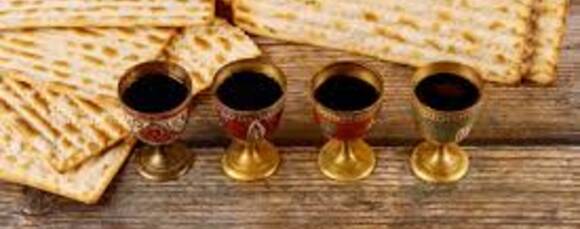Mah nishtana, the introduction to the Four Questions, sung by the youngest child at tables across the Jewish world on this night, asks "how is this night different to all other night?" or "what is different about tonight from other nights?" This year, it seems that the opening question or statement is "how different is this Passover from any we have known!" The world feels very different for most of us this year post October 7th and in diverse ways. In Israel, some are asking how we can celebrate and wish each other chag sameach, a happy festival, when there are still 133 hostages held in Gaza. The world is so fragile and broken, like that middle matzah, and we are vulnerable and afraid. How do we celebrate our freedom when so many Jewish students are feeling unsafe on campuses in the wake of anti-Israel protests that have become deeply and disturbingly antisemitic?Jewish students at Columbia have moved to online classes for fear of their safety. How different is this Passover where Jews all around the world feel threatened and afraid? Some seder tables will be fraught with tension as families express their disagreements over the continuing war, as if we are living out intergenerational trauma in a new way. I have heard stories of children and grandchildren refusing to come to the seder because of negaitve feelings about Israel's actions. Of course, many families have always played out their dysfunction on this holiday with tensions high, but it is different this year. How is this Passover different? In so many ways.
Last Shabbat, Shabbat HaGadol, we read the prophetic text from Malachi, who says "on that great day, Eliyahu haNavi, Elijah the Prophet will come and turn the hearts of parents to their children and the hearts of children to their parents." This is such a strong message of healing the trauma and conflict of generations and we deeply hope that Elijah, whose presence we bring to the seder table, will indeed bring this kind of redemption across distance and disagreement.
Many seder tables throughout the world will perform empty chair rituals and say prayers for the
chatufim, the hostages, like
this one from USCJ -
A Seat for those who Cannot Come Home. There is also this
Prayer for the Hostages in Gaza. Many homes do so painfully and literally have empty places of those who will never come home. We think of the hostages, the evacuated, the soldiers, the imprisoned and all of those for whom freedom is so far away, and how fully can we enter into a festival of freedom when so many are in captivity in various ways? And yet we do and we must. Pesach is fundamentally about resilience and hope and love and possibility. It may feel utterly different this year, but generations throughout history have celebrated Passover through miserable and desperate times and, in spite of everything, we do have miracles and abundance and an incredible community worthy of celebrating! The haggadah tells us
b'chol dor vador chayav Adam lirot et atzmot c'ilu hu yatza mimitzraim - in every generation each of us is obligated to see ourselves as if we personally came out of Egypt. Each of us have deeply personal and collective ways in which we make this journey physically and spiritualy, emotionally and mentally, from places of darkness and constraint to the light and expansiveness of hope and possibility.
Yes, we pray for the release and the healing of the
chatufim, the hostages; for Jews around the world who feel so scared; for the anguished loved ones of the murdered and captured; for the untold suffering of the innocent Palestinians; for those struggling with mental health issues, addictions, traumas of all kinds; for our people and their future in the land and everywhere; for all peoples' rights to freedom, dignity and safety. And we each pray for ourselves and our personal journeys from enslavement to redemption.
My friend and teacher in Jerusalem, Michael Kagan, shared that one of the arcs of the haggadah is from the harsh and seperate identities of the four children and that intergenerational division, to one of the concluding songs of the seder,
echad mi yodea? Who know one? As if to suggest that we move from seperation to unity (with Elijah's help) and, perhaps from brokenness to wholeness.
We have never stop dreaming of a redeemed world, and the stories, rituals and sharing of this night, however different it may feel this year, are medicine for the soul, more powerful than chicken soup!
So, yes we can say
chag sameach, where the joy is not frivolous and giddy happiness, but the power of being together, reenacting our history and the eternal journeys of the soul.
Blessings of freedom in all its forms
chag sameach
Rabbi Marc

